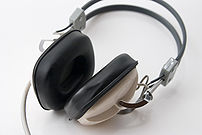That is your ear buds.
A recent study showed that personal ear bud use may cause permanent hearing loss. I use a Sansa E250 2GB MP3 Player as my personal music player of choice. It is quite versatile (including an FM tuner and microphone) and has lasted pretty well, not to mention dirt cheap! I’ve talked about my mp3 use before, especially the safety issues and sharing my personal playlist (which is now a little outdated).
In the back of my head I have thought about the impact that all of this mp3 usage might have on my ears. But never thought enough about it to worry too much. I’ve thought more about my safety while running than the impact on my hearing. I remember as a kid getting yelled at to turn down my Discman or Walkman, with the threat that I’d lose my hearing.
Now a study conducted for the European Union confirms that permanent hearing loss can come from too much and too loud of music being played in your ear drum. The New York Times reported that
The report said that those who listened for five hours a week at high-volume settings exposed themselves to more noise than permitted in the noisiest factory or work place. Maximum volume on some devices can generate as much noise as an airplane taking off nearby.
That is a lot of noise!
The report issued by the Scientific Committee on Emerging and Newly Identified Health Risks, a name which implies they probably don’t use too many iPods, had some more bad news. We might not feel the effect of our usage for many years. 5-10% of listeners may have hearing loss within 5 years, if they listen to music at a high volume for more than an hour a day. The now famous earbud may make things worse since the overall sound exposure is higher than the older, more traditional models.
A 2006 lawsuit claimed that the Apple iPod can produce music at 115 decibls, while 89 is the border line for safe listening. It begs the question of why they would produce something at that level. Well probably the same reason we keep building faster computers or cars with more horsepower. Bigger, Faster, and Louder means something is BETTER!
SO WHAT! Maybe you want to go deaf or you don’t believe in scientific research, well you can stop reading! For the rest of us they study recommends limiting listening through headphones/earbuds to no more than an hour a day – with the volume set at around 60% of the maximum volume. Got that? No more two hour long rungs with the ear buds – unless you skip a day somewhere else! This is just a guideline they offer so feel free to disobey – at your own risk and don’t sue me when you lose your hearing.
I guess I won’t be blaring my music anymore so that my training partners can hear the latest MPR program or Phedipidations episode – sorry guys.
[tags] Hearing Loss, mp3, iPod, ear bud [/tags]

![Reblog this post [with Zemanta]](https://i0.wp.com/img.zemanta.com/reblog_e.png?w=625)
 ummer officially here now and the warm weather has finally made its appearance in Minnesota – it is time to wear the flip flops 24/7 for many people. But not me, I used to wear my flip flops all the time but slowed the use of them after I started having knee and heel issues that wouldn’t seem to go away.
ummer officially here now and the warm weather has finally made its appearance in Minnesota – it is time to wear the flip flops 24/7 for many people. But not me, I used to wear my flip flops all the time but slowed the use of them after I started having knee and heel issues that wouldn’t seem to go away.